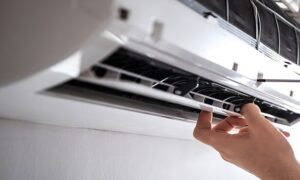Having a landlord that is able to reduce a tenant’s energy bills is an asset for a tenant and something that a tenant would be lucky to have. Hence, if you are looking to become a good landlord with tenants that will take care of your property and give you little hassle, you may want to consider it. Also, if you are paying for bills yourself as a landlord you may find that it helps you out anyway.
To begin, one way landlords can help is by installing energy-efficient appliances, such as refrigerators and washing machines, which use less electricity and water than older, less efficient models. In the same way, upgrading HVAC systems to newer, more energy-efficient models would be a great help.
On top of this, installing programmable thermostats are also effective ways to reduce energy consumption and lower energy bills for tenants and landlords can also seal air leaks around doors and windows to prevent heat loss and provide tenants with energy-saving tips and incentives for energy-efficient behaviour.
By taking these steps, landlords can help tenants save energy and money while also reducing their own carbon footprint and contributing to a more sustainable future.
Improve on HVAC systems
If you’re a landlord, upgrading your HVAC (heating, ventilation, and air conditioning) system is a smart move to help your tenant save money on energy bills as HVAC systems are extremely energy intensive.
It’s not just about being a good landlord either as a smart landlord will also want to create a more sustainable living environment.
So in order to improve a HVAC system you should begin by conducting an energy audit to identify areas of your property that are consuming the most energy and once you have a better understanding of where you can make improvements, consider choosing an energy-efficient system with a high rating.
It’s also crucial to properly size the system to ensure it’s the right fit for your property as some systems will never do the trick if your building is too large and some will be too much for just a small house like a one or two bedroom house for instance.
On top of this, it is important to not forget about implementing energy-saving measures like programmable thermostats and zoning to help your tenant save even more. Finally, schedule regular maintenance to ensure your HVAC system is running efficiently. With these upgrades and measures, you’ll not only help your tenant save on energy bills but also make a positive impact on the environment.
Upgrade older appliances
Upgrading appliances is another effective way for landlords to help their tenants save money on utility bills as old appliances can consume a lot of energy, so replacing them with newer, energy-efficient models can significantly reduce energy costs.
When upgrading appliances, look for models that have an Energy Star certification, which means they meet strict energy efficiency guidelines set by the government. Energy Star appliances are typically 10-50% more efficient than standard models, which can translate to significant savings for your tenant an can be found on appliances like toasters, kettles and fridges
Another important consideration when upgrading appliances is to choose the right size for your property as a larger appliance may consume more energy, so it’s important to choose an appliance that fits your property’s needs while still having the energy star certification which you can read more about here.
Lastly, you may want to consider offering incentives to your tenants for using energy-efficient appliances too and this is where you can really get creative with your methods. For example, you could offer a rent discount or credit for tenants who use Energy Star appliances or implement energy-saving measures in their daily lives.
Use smart thermometers
Using smart thermometers can be a very effective solution for most tenants who live in a property as these high-tech devices are designed to help you control and monitor temperature and humidity levels in your property which can help reduce waste and save energy by quite a bit.
On top of being able to control the energy usage in a property, there are a few other benefits too which will come on top of saving money such as including remote control, temperature scheduling, energy monitoring, and notifications.
With remote control, you can adjust temperature settings in your property from anywhere, making sure that energy is not wasted on heating or cooling when tenants are away and all of the statistics you need can also be transferred to a property management software like lofti to you can track numbers without having to be at the property either.
Use renewable energy
As a landlord, you can help reduce your tenant’s energy bills and make your property more eco-friendly by installing renewable energy systems.
There are several options available, including solar panels, wind turbines, and geothermal systems, that can generate electricity but it is important to note that not all solutions are the right fit for all properties and renewable energy solutions can also get very expensive.
However, once you’ve selected a system, it’s important to calculate the cost savings over the long term, and apply for rebates and incentives that can help offset the initial installation costs and also hire a qualified contractor to install the system safely and correctly.
Installing renewable energy can also increase your home’s value too so be sure to do this if you are hoping for your property to appreciate and read up on other ways you can do this too using out article on the topic.
To summarise
Landlords can help tenants save money on energy bills and reduce their carbon footprint by taking steps such as installing energy-efficient appliances, upgrading HVAC systems, using programmable thermostats, sealing air leaks, offering incentives to use energy-efficient appliances, and using renewable energy systems.
Upgrading HVAC systems involves conducting an energy audit, choosing an energy-efficient system, sizing the system properly, and implementing energy-saving measures. Upgrading appliances involves choosing the right size, looking for Energy Star certification, and offering incentives to tenants.
Using smart thermometers can help control temperature settings, monitor humidity levels, and save energy. Installing renewable energy systems can increase a property’s value and generate electricity, but costs should be calculated over the long term and incentives should be applied for.




































